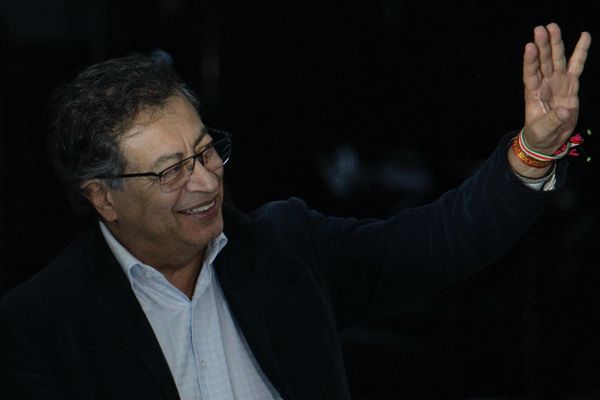
Donald Trump’s unprecedented pardoning spree for political and business friends since returning to the White House has prompted warnings from ex-prosecutors and legal scholars of “corrupt” pay-to-play schemes, conflicts of interest and blatant partisanship.
It has included hundreds of Maga allies, a cryptocurrency mogul with ties to a Trump family crypto firm, disgraced politicians, and others who could yield political and financial benefits.
Trump’s political and business driven pardons spurred strong rebukes from his first day in office, when he pardoned or commuted sentences for some 1,500 Maga allies who attacked the Capitol on January 6 and tried to block Congress from certifying Joe Biden’s election.
Since then, critics of Trump’s pardon policies have also leveled heavy fire at Trump’s radical move in May to make Maga loyalist Ed Martin, who has pushed false claims about the 2020 election results, the pardon attorney at the justice department.
Martin was tapped for the pardon post after Trump pulled his nomination to be US attorney for Washington DC due to key Republican opposition, and after Trump had ousted Liz Oyer, a veteran pardon attorney who balked at granting clemency to a Trump ally.
Recently, Trump has sparked strong criticism for commutations or pardons that seem increasingly aimed at boosting political allies and some Trump family business interests, say legal experts and ex-prosecutors.
Last month, Trump commuted a seven-year sentence of expelled House member George Santos, who pleaded guilty in 2024 to 13 counts including fraud and identity theft and had only served a few months.
Trump fueled more criticism last month when he pardoned Changpeng Zhao, the multibillionaire who founded Binance, a huge crypto exchange that earlier this year inked a $2bn investment deal involving the Trump family crypto firm World Liberty Financial that is expected to yield tens of millions yearly to the Trump family.
Zhao pleaded guilty in 2023 to breaking anti money-laundering laws, served a four-month sentence and stepped down as Binance CEO but remains its largest shareholder.
Binance agreed in 2023 to pay more than $4bn to settle related DoJ charges of violating anti money-laundering laws.
In a 60 Minutes interview with Trump in November, the optics of the Zhao pardon, which came after Zhao and Binance mounted big lobbying drives, worsened when Trump admitted: “I don’t know who he is. I know he got a four-month sentence or something like that. And I heard it was a Biden witch-hunt.”
After his pardon, Zhao posted on X that he was “deeply grateful” and pledged to “do everything we can to help make America the Capital of Crypto”, which aligns well with Trump’s promises and his crypto deregulatory moves.
Separately, and in a largely symbolic move, Martin posted on X on Sunday that Trump had granted pre-emptive pardons to over 70 Maga allies, including his ex-lawyer Rudy Giuliani and ex-chief of staff Mark Meadows, who worked on efforts to create fake electors from key states in an effort to subvert Trump’s 2020 loss. None face federal charges, but a number of them have been under scrutiny or charged by some states, including Arizona, for conspiring to subvert Trump’s loss, which will not be affected by the pardons.
Legal experts say that although other presidents, including Democrats Biden and Bill Clinton, have received criticism for granting some controversial pardons, Trump’s use of pardons to boost political and financial interests has been egregious and part of his extensive weaponization of the justice department to go after political foes and help Maga allies.
“The corruption of the pardon process is one of the less visible but nevertheless important aspects of Trump’s sullying of the Justice Department,” said Philip Lacovara, who was counsel to the Watergate special prosecutor.
Lacovara called the commutation of Santos’ sentence after only a few months in prison “bewildering”. He stressed that Santos “never exhibited any remorse for his chain of frauds, and his sentence was well within the federal guidelines for his crimes”.
Similarly, Lacovara condemned the pardon of Zhao as part of Trump’s “pay-to-play policy approach to pardons”, and was skeptical of Trump’s vague explanation that “people whom he trusted recommended this otherwise incomprehensible exoneration. The Trump family connection with crypto based fortunes suggests a likely source for that recommendation.”
Other legal experts see Trump’s pardon abuses as akin to a “form of bribery”.
“The pardon process as a method for granting executive grace for deserving criminal defendants has been replaced by a pay-to-play system that is a thinly disguised form of bribery,” said former justice department inspector general Michael Bromwich.
“Pardons are now conferred not on people who acknowledge their guilt and deserve a break, but instead on those who have connections and plenty of money.”
Bromwich’s critique is underscored by growing concerns about Martin’s role as pardon attorney, voiced by other ex-prosecutors, top Democrats in Congress, including Congressman Jamie Raskin of Maryland and Senator Dick Durbin of Illinois, and ex-pardon attorney Oyer.
Trump tapped uber-loyalist Martin to replace Oyer, who Trump had fired in March the day after she nixed restoring gun rights for actor Mel Gibson, a Trump supporter who had lost his gun rights due to a 2011 domestic violence conviction.
Martin’s Maga ties were demonstrated the day before January 6, when he addressed a DC rally of Trump loyalists and said: “Thank you for standing for our president. But remember, what they’re stealing is not just an election. It’s our future.”
Besides pushing false claims about election fraud in Trump’s 2020 loss, Martin also did legal work for some of those charged for their January 6 roles in the Capitol attack.
Barbara McQuade, a former federal prosecutor who now teaches law at the University of Michigan, noted critically that when Martin became pardon attorney, he posted on social media: “No Maga left behind.”
“That statement is a deeply disturbing violation of DOJ policy to avoid partisan politics. It suggests that supporters of President Trump will be treated favorably,” McQuade said.
Martin showed his fealty to Trump and Maga allies after Santos was pardoned by posting on X: “I was honored as U.S. Pardon Attorney to have played a small role” in the clemency grant, adding thanks to Trump for “making clemency great again”.
Oyer is sharply critical of Martin’s tenure as pardon attorney.
“The pardon power has been thoroughly corrupted and politicized under Donald Trump. Ed Martin’s appointment as pardon attorney leaves no path forward for ordinary Americans seeking second chances through clemency,” Oyer told the Guardian.
“Martin has repeatedly stated that he views pardons as a reward for Maga loyalists. His views on the pardon power appear to be totally untethered to merit – or to the merit-based standards laid out in [the] DoJ’s justice manual, which have guided his numerous predecessors.”
Oyer added: “There are currently at least 15,000 clemency applications pending with Martin’s office-which it appears he is largely ignoring as he focuses on his Maga-first priorities.”
In a novel pardon twist last week, Martin told a key House Oversight panel that he was conducting an “investigation” of pardons and commutations by Biden. This Martin inquiry dovetails with Trump attacks on preemptive clemency that Biden gave to House select committee members who investigated the January 6 insurrection should they face charges if Trump won the 2024 election. It marks a sharp break with the traditional role of pardon attorneys.
In an email to the House panel’s chairman that CNN’s Jake Tapper obtained, Martin wrote: “My ongoing investigation has revealed abuses of the pardon and commutation process by political actors in the Biden administration. The use of AutoPen at the direction of staff and perhaps others is troubling.”
Previously, the justice department had indicated that the use of an autopen by a president was legally sound.
Besides this new inquiry, Martin also leads a DoJ “weaponization working group” to combat alleged Democratic weaponization of the department, and has helped push for criminal charges against some of Trump’s avowed enemies, including ex-FBI director James Comey and New York attorney general Letitia James.
Comey and James were indicted separately this fall by a Trump-installed novice prosecutor in Virginia after a veteran prosecutor, who thought the evidence against them was weak, was forced out by Trump, who had publicly urged charges be filed against them and others. Comey and James have pleaded not guilty.
Martin’s tenure as pardon attorney drew an early attack from Raskin, who wrote to him in late May about pardon decisions that suggested Martin had violated long standing pardon requirements in order to “reward Trump loyalists and the ultra-rich”.
Raskin noted that in just two weeks as pardon attorney, Martin’s office had pardoned over two dozen Maga loyalists and wealthy criminals who “paid millions to avoid prison time and repaying victims”.
“Donald Trump has plunged the pardon power into complete corruption, using it to reward his political sycophants and underling servants, his giant campaign donors, his business associates and his partners in fraud,” Raskin told the Guardian.
“Beyond thoroughly politicizing the office of the pardon attorney and destroying its legal and ethical legitimacy, President Trump has not even required the political loyalists and operators he pardons to repay their victims with restitution or even to show any kind of personal repentance.”
Raskin noted that a judiciary committee report in June found “Trump’s pardons have made criminals $1.3bn richer by allowing them to keep the money they stole from their victims and dodge their fines. The pardon power in Trump’s hands is a way to take a huge amount of wealth that is legally owed to victims and transfer it back to the criminals who stole it from them in the first place.”
Other legal experts voice loud alarms about Trump’s “authoritarian” modus operandi in granting pardons.
“President Trump’s pardon spree is disturbing,” said David Pozen, a law professor at Columbia University. “In the near term, his meting out of pardons for blatantly corrupt and self-serving ends is a classic authoritarian tactic that undermines the rule of law.”
“In the longer term, such abuses will tend to undermine support for the pardon power itself and the vital role it can play, when employed in a principled fashion, in checking excessive punishment and prosecutorial overreach.”
In the long run, Lacovara views Trump’s installing Martin as pardon attorney as uniquely dangerous.
“While other presidents occasionally exercised their prerogatives to extend clemency to relatives or friends, never in my experience has any president installed a political operative who could not even win confirmation by a Republican Senate to serve as US attorney in Washington, as part of a process designed to reward political allies and business associates for their loyalty and generosity.”







